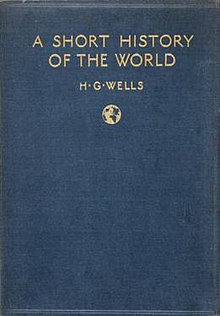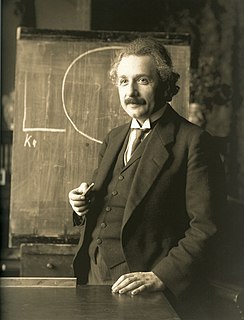
Albert Einstein was a German-born theoretical physicist who developed the theory of relativity, one of the two pillars of modern physics. His work is also known for its influence on the philosophy of science. He is best known to the general public for his mass–energy equivalence formula , which has been dubbed "the world's most famous equation". He received the 1921 Nobel Prize in Physics "for his services to theoretical physics, and especially for his discovery of the law of the photoelectric effect", a pivotal step in the development of quantum theory.
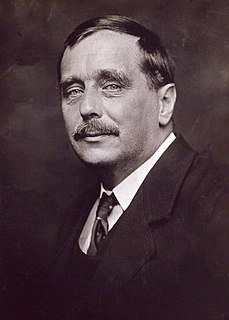
Herbert George Wells was an English writer. He was prolific in many genres, writing dozens of novels, short stories, and works of social commentary, history, satire, biography, and autobiography, and even including two books on recreational war games. He is now best remembered for his science fiction novels and is often called the "father of science fiction", along with Jules Verne and the publisher Hugo Gernsback.

The theory of relativity usually encompasses two interrelated theories by Albert Einstein: special relativity and general relativity. Special relativity applies to all physical phenomena in the absence of gravity. General relativity explains the law of gravitation and its relation to other forces of nature. It applies to the cosmological and astrophysical realm, including astronomy.
Charles Hutchins Hapgood was an American college professor and author who became one of the best known advocates of the pseudoarchaeological claim of a rapid and recent pole shift with catastrophic results.

Penguin Books is a British publishing house. It was co-founded in 1935 by Sir Allen Lane with his brothers Richard and John, as a line of the publishers The Bodley Head, only becoming a separate company the following year. Penguin revolutionised publishing in the 1930s through its inexpensive paperbacks, sold through Woolworths and other high street stores for sixpence, bringing high-quality paperback fiction and non-fiction to the mass market. Penguin's success demonstrated that large audiences existed for serious books. Penguin also had a significant impact on public debate in Britain, through its books on British culture, politics, the arts, and science.

The Outline of History, subtitled either "The Whole Story of Man" or "Being a Plain History of Life and Mankind", is a work by H. G. Wells chronicling the history of the world from the origin of the Earth to the First World War. It appeared in an illustrated version of 24 fortnightly installments beginning on 22 November 1919 and was published as a single volume in 1920. It sold more than two million copies, was translated into many languages, and had a considerable impact on the teaching of history in institutions of higher education. Wells modeled the Outline on the Encyclopédie of Denis Diderot.
The Thinker's Library was a series of 140 small hardcover books published between 1929 and 1951 for the Rationalist Press Association by Watts & Co., London, a company founded by Charles Albert Watts. They consisted of a selection of essays, literature, and extracts from greater works by various classical and contemporary humanists and rationalists, continuing in the tradition of the Renaissance. Many of the titles were cheap reprints of classic books, aimed at a mass audience.

Vladimir Aleksandrovich Fock was a Soviet physicist, who did foundational work on quantum mechanics and quantum electrodynamics.

Alfred Einstein was a German-American musicologist and music editor. He was born in Munich and fled Nazi Germany after Hitler's Machtergreifung, arriving in the United States by 1939. He is best known for being the editor of the first major revision of the Köchel catalogue, which was published in the year 1936. The Köchel catalogue is the extensive catalogue of the works of Wolfgang Amadeus Mozart.
Christopher Henry Dawson was a British independent scholar, who wrote many books on cultural history and Christendom. Dawson has been called "the greatest English-speaking Catholic historian of the twentieth century". The 1988–1989 academic year at the College of Europe was named in his honour.

Manly Palmer Hall was a Canadian-born author, lecturer, astrologer and mystic. He is best known for his 1928 work The Secret Teachings of All Ages. Over his 70 year career, he gave thousands of lectures, including two at Carnegie Hall, and published over 150 volumes. In 1934, he founded The Philosophical Research Society in Los Angeles, which he dedicated to the "Truth Seekers of All Time", with a research library, lecture hall and publishing house. Many of his lectures can be found online and his books are still in print.

The Science of Life is a book written by H. G. Wells, Julian Huxley and G. P. Wells, published in three volumes by The Waverley Publishing Company Ltd in 1929–30, giving a popular account of all major aspects of biology as known in the 1920s. It has been called "the first modern textbook of biology" and "the best popular introduction to the biological sciences". Wells's most recent biographer notes that The Science of Life "is not quite as dated as one might suppose".

Fingerprints of the Gods: The Evidence of Earth's Lost Civilization is a 1995 pseudoarcheology book by Graham Hancock, in which the author echoes 19th-century writer Ignatius Donnelly, author of Atlantis: The Antediluvian World (1882), in contending that some enigmatic, ancient but highly advanced civilization had existed in prehistory, one which served as the common progenitor civilisation to all subsequent known ancient historical ones. The author proposes that sometime around the end of the last Ice Age this civilisation ended in cataclysm, but passed on to its inheritors profound knowledge of such things as astronomy, architecture, and mathematics.
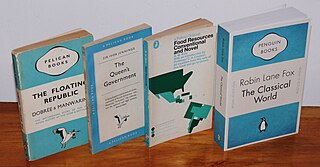
Pelican Books is a non-fiction imprint of Penguin Books. Founded in 1937, Pelican Books combined important topics with clear prose to create inexpensive paperbacks for a broad audience. Before being discontinued in 1984, Pelican Books published thousands of accessible, stimulating books covering a wide range of subjects from classical music to molecular biology to architecture. The imprint was relaunched in April 2014, with the first five titles appearing in May.
William Elliot Griffis was an American orientalist, Congregational minister, lecturer, and prolific author.
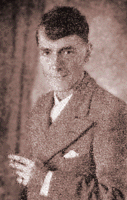
Lancelot Thomas Hogben FRS FRSE was a British experimental zoologist and medical statistician. He developed the African clawed frog (Xenopus laevis) as a model organism for biological research in his early career, attacked the eugenics movement in the middle of his career, and popularised books on science, mathematics and language in his later career.

The Everlasting Man is a Christian apologetics book written by G. K. Chesterton, published in 1925. It is, to some extent, a deliberate rebuttal of H. G. Wells' The Outline of History, disputing Wells' portrayals of human life and civilisation as a seamless development from animal life and of Jesus Christ as merely another charismatic figure. Chesterton detailed his own spiritual journey in Orthodoxy, but in this book he tries to illustrate the spiritual journey of humanity, or at least of Western civilisation. The author Ross Douthat credits that, "Chesterton's somewhat loosey-goosey outline of history doubles as the best modern argument for Christianity I've ever read. You have to give in to the Chestertonian style, but if you do, be careful — you might just be converted."
Archibald Thomas Robertson was a Southern Baptist preacher and biblical scholar whose work focused on the New Testament and Koine Greek.

H. G. Wells was a prolific writer of both fiction and non-fiction. His writing career spanned more than sixty years, and his early science fiction novels earned him the title of "The Father of Science Fiction".
The following outline is provided as an overview of and topical guide to Albert Einstein:
